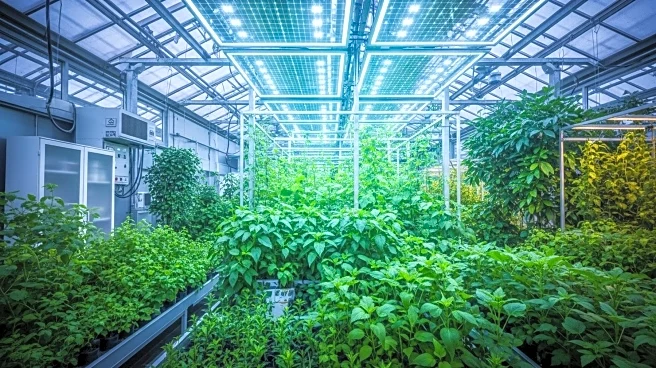What is the story about?
What's Happening?
UbiQD, a U.S. startup, has developed a new type of solar glass that significantly enhances greenhouse productivity. The solar glass, infused with quantum dots, was tested by researchers at the University of California – Davis, who found it increased lettuce crop yields by nearly 40%. Quantum dots are tiny semiconductor particles that manipulate color and light, enhancing photoluminescence. The study, published in Materials Today Sustainability, demonstrated that the solar glass improved biomass, leaf area, root length, and nutrient concentrations in lettuce. This innovation could lead to more resilient and sustainable food systems by optimizing greenhouse microclimates without additional energy input.
Why It's Important?
The development of quantum dot solar glass represents a significant advancement in climate-smart agriculture. By increasing crop yields without additional energy costs, this technology could transform greenhouse farming and support the growing vertical farm industry. The enhanced productivity and nutrient content of crops grown under this glass could benefit farmers and consumers alike, potentially reducing food costs and improving food security. Additionally, the integration of this technology into agriculture aligns with broader sustainable energy strategies, offering a passive solution to enhance food production while reducing reliance on fossil fuels.
What's Next?
UbiQD plans to scale up the commercial use of its solar glass technology, with ongoing applications in greenhouses worldwide. The company is also exploring the integration of quantum dot technology into thin film solar cells through a partnership with First Solar. This collaboration aims to expand power generation capacity in the U.S., addressing demands from data centers and manufacturing. The potential use of bifacial solar modules in agrivoltaics could further enhance sustainable agriculture practices, offering innovative solutions for energy and food production.
Beyond the Headlines
The application of quantum dot technology in solar glass could lead to broader implications for energy efficiency and sustainability. Transparent solar cells, another emerging technology, could transform building design by integrating power generation into glass facades. This could reduce energy consumption in urban environments and contribute to the transition towards renewable energy sources. The ongoing research and development in this field highlight the potential for significant shifts in both agricultural and energy sectors.
















